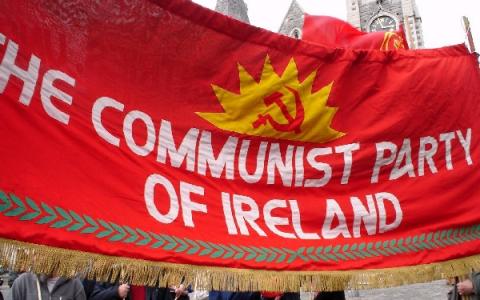Minor skirmish mars anti-government protest

Minor skirmishes marred an otherwise peaceful march against the government's reponse to the current economic crisis. By Joe Galvin.
A small number of protesters attempted to breach the Garda cordon outside Dáil Eireann, and some received minor injuries. It was a small scale disturbance, with Richard Boyd-Barrett, a councillor with People before Profit, and Dr. Kieran Allen, a professor in UCD, critical of what they saw as an over-zealous response by Gardaí. The episode lasted less than five minutes, and was unrepresentative of an event that passed off largely peacefully and in good humour.
Driving rain undoubtedly affected the attendance at the march, but the enthusiasm of those that attended was not dampened by the adverse weather conditions. Approximately 1,200 protesters braved the elements to protest in particular at the government's policies in relation to Ireland's banking system.
Audio: Fintan O'Toole's full speech at the recent protest against government cutbacks. Mr. O'Toole was subsequently criticised by Terry Leydon of Fianna Fail for inciting clashes with the Gardai.
{saudioplayer}FintanOTProtestSpeech.mp3{/saudioplayer}
The march, organised by the newly formed Right to Work campaign, began at the Garden of Remembrance by Dublin's O'Connell Street, before winding its sodden way to the gates of the Oireachtas. The assembled crowd was addressed by a number of speakers, including Boyd-Barrett, Fintan O'Toole of the Irish Times, Siobhan O'Donoghue of the Community Workers Co-op and Dr. John Bissett of the Canal Communities Community Development Project.
O'Toole said Ireland comprised two "parallel universes", one where "vulnerable people are being...increasingly impoverished...and given no hope for the future", the other where "there is no cheque [the government] will not write...in order to put into a corrupt, failed banking system".
"The people who bankrupted our economy...are getting away scot free," said O'Donoghue. "The people who are most vulnerable are being demonised are criminalised." She said it was in the national interest to "reverse inequality, not to deepen it".
Dr. John Bissett, in a particularly passionate speech, said the government was in a "civil war" against "almost everybody in this country who doesn't have the power". Boyd-Barrett was the last to speak, and he called the government's economic policy "obscene".
"The day of the speculator, of the financial vampire...has to end," said Boyd-Barrett. "We want an economy...a banking system and a society where jobs, services and human dignity and a decent standard of life for all are the features."
A large number of left wing political groups were represented at the march, including the Labour Party, Sinn Féin, the People before Profit Alliance, the Socialist Party and the Socialist Worker's Party. Politico asked Boyd-Barrett whether or not a left alliance at the next election was a possibility and, if it was, who it would comprise.
"We're very hopeful that...a left slate will be in place," Boyd-Barrett told Politico. "There's agreement in principle that there will be a left slate...precise details of its programme are still being hammered out." Boyd-Barrett said that this alliance was "open to discussion" with any left wing groups, including the Labour Party and Sinn Féin. However, he said those parties would first have to rule out any prospect of a coalition with either Fianna Fáil or Fine Gael.
This protest is the first of a series of protests, with the next due to take place outside Dáil Eireann at 19.30 on Tuesday 18 May. "This is first the of many," O'Donoghue told Politico. "We're relearning the art of protesting." Boyd-Barrett said he hoped it would be a "springboard" for further protests.
Indeed, Boyd-Barrett called on the protest to be the "beginning of a movement" against the government. Next week's protests may show whether or not such a movement has taken hold.
